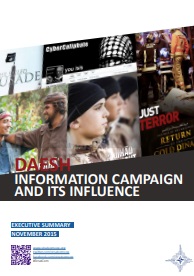DAESH INFORMATION CAMPAIGN AND ITS INFLUENCE
DAESH INFORMATION CAMPAIGN AND ITS INFLUENCE
Author(s): Author Not Specified
Subject(s): Politics, Media studies, Communication studies, Security and defense, Social psychology and group interaction, Evaluation research, ICT Information and Communications Technologies, Peace and Conflict Studies
Published by: NATO Strategic Communications Centre of Excellence
Keywords: extremist groups; terror; Daesh; information; communication; media; psychology; ICT; social media;
Summary/Abstract: The terrorist organization, Daesh, also known as so-called Islamic State/IS/ISIS/ISIL, has launched an extremely sophisticated information campaign at various target audiences in order to gain support for its expansion in the Middle East. Daesh’s first strategic achievement, drawing considerable attention from various governments and mainstream Muslim groups, was the first public speech given by self-proclaimed Caliph, Abu Bakr al-Baghdadi. It was devoted entirely to the proclamation of the so-called Caliphate. In order to find out how this campaign is managed, and to propose practical solutions to existing challenges concerning situation on the Middle East, the NATO Strategic Communications Centre of Excellence (NATO StratCom COE) conducted research into Daesh’s information strategy. The methodology for analysing Daesh’s information strategy included a number of techniques such as social psychology, the psychology of communication, and social media analysis. The work was done in consultation with social media experts and advisors from NATO member states in order to achieve the best result. This executive summary summarizes three reports - “Type of applied persuasive strategy and its influence on message effectiveness” (Ph. D. T. Grzyb), „Visual framing in the Islamic State” (Ph. D. Shahira Fahmy) and “Network of Terror: How Daesh Uses Adaptive Social Networks to Spread its Message” (Mr. Joseph Shaheen).
- Page Count: 4
- Publication Year: 2015
- Language: English
- Content File-PDF
- Introduction

